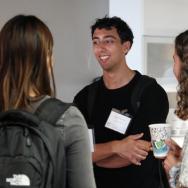Prof. Angela V. Olinto has been reappointed as dean of the Division of the Physical Sciences, President Paul Alivisatos and Provost Katherine Baicker announced on June 5.
A leading scholar in astroparticle physics and cosmology, Olinto is the Albert A. Michelson Distinguished Service Professor in the Department of Astronomy and Astrophysics, the Kavli Institute for Cosmological Physics, and the Enrico Fermi Institute.
“Angela is a bold and ambitious leader who has fostered a culture of excellence, innovation and collaboration across the division,” Baicker said. “Her contributions have led to groundbreaking research and significant advancements across multiple areas of scholarship and education. I look forward to seeing the transformative impact she will continue to have in the years to come.”
Since being appointed dean in 2018, Olinto has expanded the number, breadth and diversity of the division’s faculty, while spearheading several new research and teaching initiatives. During her term, she helped launch the Institute for Mathematical and Statistical Innovation, the Data Science Institute, and new academic programs in data science including a Ph.D. program, two MS programs, and a major and minor in the College. In addition, Olinto is supporting new initiatives in the origins of life, plant biology, climate and life, and biological physics. Under her direction, the division has experienced a substantial increase in undergraduate enrollment, accompanied by a significant surge in applications to its Ph.D. and MS programs.
During Olinto’s tenure as dean, the division received more than $125 million in gifts and research grant awards surpassed $540 million. In partnership with multiple leaders across campus, she led the development of a new research infrastructure for engineering and science units resulting in the construction of the High Bay Research Building, a world-class facility for physical science research and large-scale instrument fabrication. Olinto also helped create the first annual South Side Science Festival, which was held last fall and drew more than 2,500 community members to campus to learn about science.
A renowned scientist, Olinto has made significant contributions to the study of the structure of neutron stars; primordial inflationary theory; cosmic magnetic fields; the nature of the dark matter; and the origin of the highest energy cosmic rays, gamma rays and neutrinos. She is the principal investigator of the Probe of Extreme Multi-Messenger Astrophysics space mission and the Extreme Universe Space Observatory on a Super Pressure Balloon mission, and was a member of the Pierre Auger Observatory—all designed to discover the origin of the highest energy cosmic particles, their sources and their interactions. Last month, her team launched a pioneering NASA mission designed to study extremely high-energy particles in the universe.
“It has been a privilege to help advance the research and teaching of the Division of the Physical Sciences over the last five years,” Olinto said. “I am inspired to continue to build on our tradition of defining and advancing new fields in the physical and mathematical sciences. I look forward to working with our trailblazing faculty, researchers, students and staff in the years ahead.”

